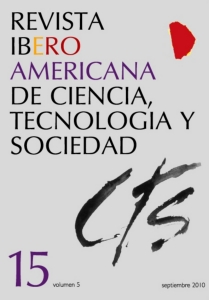Simulated Case: "A Vaccine Against AIDS"
A Brazilian Experience
DOI:
https://doi.org/10.52712/issn.1850-0013-826Keywords:
AIDS, adolescence, scientific knowledge, preventionAbstract
The development of prevention strategies and dissemination of concepts related to AIDS for interested young people, in addition to informing them scientifically, acts as a proposal for interacting with this knowledge, aiming at their participatory integration in society. This paper investigated the effect of a simulated case involving a scientific controversy about an AIDS vaccine on the scientific knowledge of Brazilian teenagers studying in high schools. One hundred students (coming from the 2nd grade of secondary education at a public school of the federal network of education of the city of Florianopolis) participated in this study. The Test of Scientific Knowledge about HIV/AIDS (TCCHA) was used before and after the activity to measure its effect on scientific knowledge. The data revealed that the process of sharing information about HIV/AIDS among students affected their knowledge in a significant way, since there has been a considerable increase in scientific knowledge between the first and second step of the test. Therefore, the simulated case proved to be an effective strategy for increasing knowledge on this subject for high school students.
Downloads
References
ABRIC, J. C. (1996): ”Facteurs généraux dela communication”, em J. C. Abric (coord.): Psychologie de la comunication: méthodos e théories, Paris, Masson & Armand Colin, pp. 7-24.
BAZZO, W. A. (1998): Ciência tecnologia e sociedade e o contexto da educação tecnológica, Florianópolis, Editora da UFSC.
BAZZO, W. A. e PEREIRA, L. T. V. (2005): AIDS-2000: A vacina contra a AIDS (Simulação educativa de um caso CTS sobre a saúde), adaptado e traduzido do original de Martín Gordillo (2001), Curso á distância: Enfoque CTS, Universidad de Oviedo e Nepet – UFSC.
CAMARGO, B. e BARBARÁ, A. (2004): “Efeitos de panfletos informativos sobre a aids em adolescentes”. Psicologia: Teoria e Pesquisa, vol. 20, n° 3, pp. 279-287.
CAMARGO, B. V., BARBARÁ, A. e BERTOLDO, R. (2005): “Um instrumento de medida da dimensão informativa da representação social da aids” [Trabalho Completo], em IV Jornada Internacional e II Conferência Brasileira sobre Representações Sociais: Teoria e Abordagens Metodológicas, João Pessoa, JIRS.
CLERMONT, A. P. (1994): “Interações sociais no desenvolvimento cognitivo: Novas direções de pesquisa”, Cadernos de Psicossociologia e Educação, nº 2, pp. 7-30.
LÓPEZ CEREZO, J. A. e LUJÁN, J. L. (2000): Ciencia y política del riesgo, Madrid, Alianza Editorial.
RODRIGUES, A., ASSMAR, E. M. L. e JABLONSKI, B. (2002): Psicologia social, Petrópolis, Vozes.
LLOYD, B. (1994): ”Différences entre sexes”, em S. Moscovici (org.): Psychologie Sociale des relations à altrui, Paris, Nathan, pp. 280-296.
MARTÍN GORDILLO, M. (2001): AIDS-2000: La vacuna contra el SIDA, simulación educativa de un caso CTS sobre la salud, Madrid, OEI.
MARTÍN GORDILLO, M., OSORIO, C. e LÓPEZ CEREZO, J. A. (2001): “La educación en valores a través de CTS”, em G. Hoyos Vásquez e cols. (Orgs.): La educación en valores en Iberoamérica, Madrid, OEI, Papeles Iberoamericanos, pp. 119-161. Disponible en: http://www.campus-oei.org/salactsi/mgordillo.htm.
MEIRELLES, B. H. S. (2003): Viver saudável em tempos de aids. A complexidade e a interdisciplinaridade no contexto de prevenção da infecção pelo vírus HIV, Tese (Doutorado em Enfermagem), Programa Pós-Graduação em Enfermagem (UFSC), Florianópolis, pp. 62-77.
MORIN, E. (2000): Os sete saberes necessários à educação do futuro, Brasília, Cortez/UNESCO.
SAMAGAIA, R. R. (2003): Uma experiência com o projeto Manhattan no ensino fundamental: Interdisciplinaridade e ação em sala de aula, Dissertação de Mestrado, Universidade federal de Santa Catarina.
WAGNER, W. (1995): “A ciência e a sua representação”, Psicologia e Práticas Sociais, nº 2, pp. 5-22.
Downloads
Published
How to Cite
Issue
Section
License
Copyright (c) 2025 CC Attribution 4.0

This work is licensed under a Creative Commons Attribution 4.0 International License.
All CTS's issues and academic articles are under a CC-BY license.
Since 2007, CTS has provided open and free access to all its contents, including the complete archive of its quarterly edition and the different products presented in its electronic platform. This decision is based on the belief that offering free access to published materials helps to build a greater and better exchange of knowledge.
In turn, for the quarterly edition, CTS allows institutional and thematic repositories, as well as personal web pages, to self-archive articles in their post-print or editorial version, immediately after the publication of the final version of each issue and under the condition that a link to the original source will be incorporated into the self-archive.











